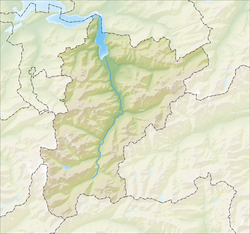Schattdorf
| Schattdorf | ||
|---|---|---|
 |
||
|
||
| Coordinates: 46°51′N 8°39′E / 46.850°N 8.650°ECoordinates: 46°51′N 8°39′E / 46.850°N 8.650°E | ||
| Country | Switzerland | |
| Canton | Uri | |
| District | n.a. | |
| Area | ||
| • Total | 16.31 km2 (6.30 sq mi) | |
| Elevation | 481 m (1,578 ft) | |
| Population (Dec 2015) | ||
| • Total | 5,041 | |
| • Density | 310/km2 (800/sq mi) | |
| Postal code | 6467 | |
| SFOS number | 1213 | |
| Surrounded by | Attinghausen, Bürglen, Erstfeld, Silenen, Spiringen, Unterschächen | |
| Website |
www SFSO statistics |
|
Schattdorf is a village and a municipality in the canton of Uri in Switzerland.
Schattdorf is first mentioned in 1248 as Sachdorf.
Schattdorf has an area, as of 2006[update], of 16.3 km2 (6.3 sq mi). Of this area, 33.6% is used for agricultural purposes, while 37.7% is forested. Of the rest of the land, 11% is settled (buildings or roads) and the remainder (17.8%) is non-productive (rivers, glaciers or mountains). In the 1997 land survey[update], 29.1% of the total land area was heavily forested, while 4.5% is covered in small trees and shrubbery. Of the agricultural land, 0.4% is used for farming or pastures, while 23.4% is used for orchards or vine crops and 9.8% is used for alpine pastures. Of the settled areas, 4.3% is covered with buildings, 3.5% is industrial, 0.2% is classed as special developments, 0.5% is listed as parks and greenbelts and 2.5% is transportation infrastructure. Of the unproductive areas, 0.9% is unproductive flowing water (rivers), 8.2% is too rocky for vegetation, and 8.7% is other unproductive land.
The municipality is located along the Reuss between the Schächenbach and the Reuss. The village is located on the valley floor but stretches up the mountain side to the hamlet of Haldi which is 1,079 m (3,540 ft) above sea level.
Schattdorf has a population (as of 31 December 2015) of 5,041. As of 2007[update], 6.5% of the population was made up of foreign nationals. Over the last 10 years the population has decreased at a rate of -4.7%. Most of the population (as of 2000[update]) speaks German (94.7%), with Serbo-Croatian being second most common ( 1.5%) and Italian being third ( 0.9%). As of 2007[update] the gender distribution of the population was 51.0% male and 49.0% female.
...
Wikipedia




